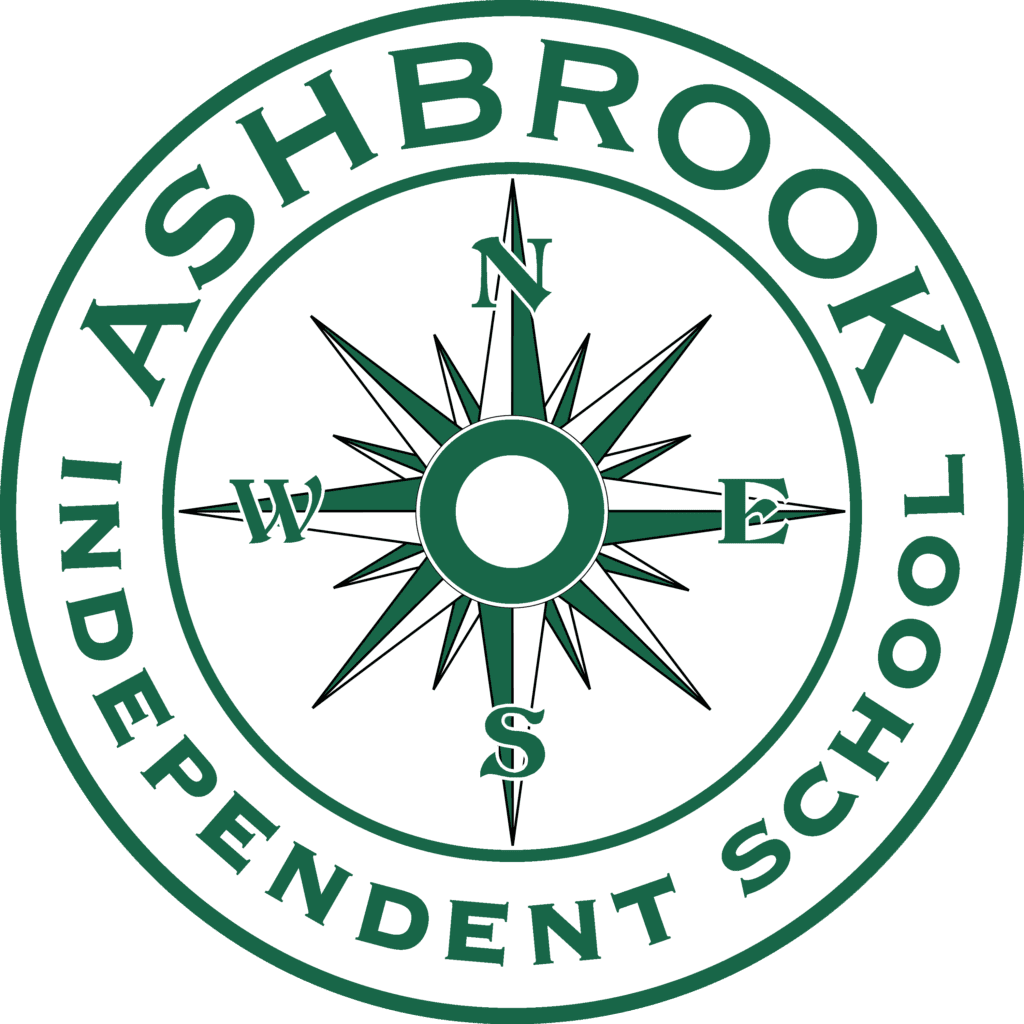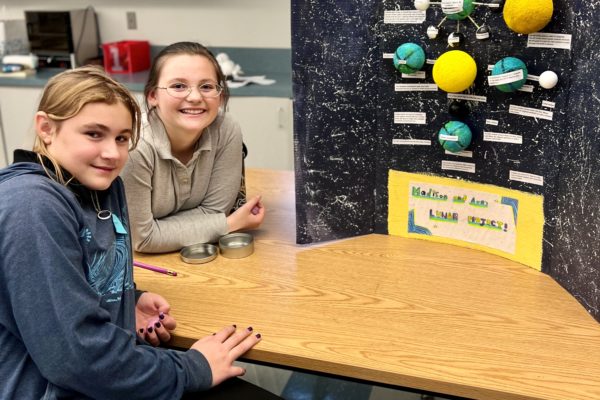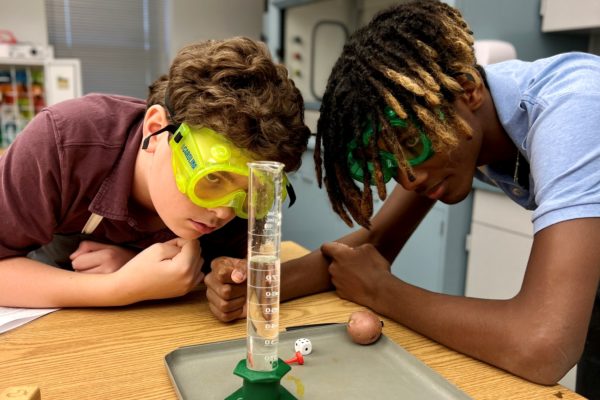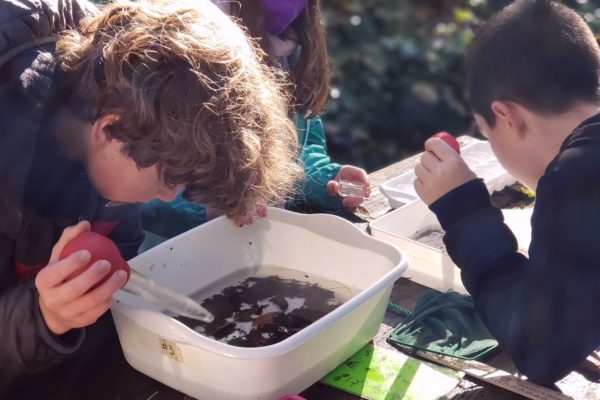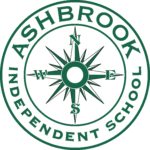Ashbrook students in grades 5 through 8 continue to build and expand basic knowledge by developing higher level thinking skills, including application, analysis, synthesis, and integration of content areas. In-depth learning, time management, and organizational skills are emphasized. While providing transparency regarding the student experience, teachers emphasize conceptual understanding, problem solving, and skill building.
Middle School: Grades 5-8
Middle School Curriculum
5th Grade Overview
Welcome to a pivotal year of growth, empowerment, and preparation for the exciting world of middle school! Our 5th grade transition program is thoughtfully designed to help students seamlessly navigate the shift from elementary to middle school, ensuring a confident start and a successful academic journey ahead. With a focus on building essential skills, fostering independence, and promoting self-assurance, we guide students through this important milestone with care and support. Fifth grade students study the core subjects of math, English/language arts, science, and history with a homeroom teacher. As they progress throughout the school day, students move to different classrooms for their specific electives which include art, beginning band, P.E./health, world languages, and technology classes. Additionally, the 5th grade students spend 6 weeks every term with each of the middle school teachers during a rotation class. This mini-class serves as an introduction to each middle school teacher’s subject area and supports a smooth transition to 6th grade.
Click each section to read more curriculum information about 5th Grade.
The fifth grade literacy curriculum is designed to develop critical thinking, foster independent reading and writing, and enhance advanced vocabulary skills through a comprehensive approach that includes whole class novel studies, discussions, and varied writing assignments. Students engage in in-depth analyses of complex texts during novel studies, participating in thoughtful discussions that challenge their interpretations and deepen their understanding. These activities promote advanced vocabulary acquisition and usage, as students encounter and utilize sophisticated language in context. Writing instruction focuses on crafting well-organized essays and research reports, where students learn to structure their ideas coherently and support their arguments with evidence. This curriculum ensures that by the end of fifth grade, students are not only proficient readers and writers but also critical thinkers capable of tackling advanced literary and writing tasks independently.
The fifth grade math curriculum using Big Ideas Math is designed to enhance students’ understanding of key mathematical concepts through an engaging and rigorous approach. The curriculum covers a broad range of topics, including fractions, decimals, volume, and geometry, with a strong emphasis on problem-solving and critical thinking. Big Ideas Math uses a research-based instructional model that integrates direct instruction with exploratory learning, allowing students to build a deep conceptual understanding while applying their skills to real-world situations. Interactive digital resources, visual models, and hands-on activities further enrich the learning experience, catering to diverse learning styles and needs. Students who demonstrate mastery of the content are offered an advanced option to progress to Pre-Algebra, providing them with the opportunity to deepen their mathematical understanding and prepare for more advanced concepts in middle school and beyond.
In fifth grade, the Inspire Science curriculum provides a comprehensive exploration of Earth’s resources and surfaces, emphasizing hands-on learning and inquiry-based investigations. Students delve into topics such as the Earth’s natural resources, including minerals, water, and energy sources, learning about their formation, distribution, and sustainability. They also study Earth’s surfaces, examining processes such as weathering, erosion, and plate tectonics that shape the planet’s landscapes. Through experiments, simulations, and real-world applications, students develop a deep understanding of environmental science and geological concepts. The curriculum encourages critical thinking and problem-solving skills as students explore solutions to global challenges related to resource management and environmental conservation, preparing them to become informed stewards of our planet’s natural resources.
In fifth grade, the history curriculum focuses on ancient civilizations, immersing students in the rich tapestry of human history from Mesopotamia and ancient Egypt to Greece and beyond. Students explore the social, political, economic, and cultural achievements of these civilizations through interactive lessons, primary source analysis, and engaging projects. They investigate topics such as the development of writing systems, the rise of city-states, the impact of trade routes, and the contributions of notable figures. Through this exploration, students gain a deeper appreciation for the complexities of ancient societies and how they have shaped modern civilizations. The curriculum fosters critical thinking, historical inquiry, and a broader understanding of global connections, preparing students to appreciate the continuity and diversity of human experiences across time.
Grades 6-8 Overview
Core I Classes
Our middle school’s core classes are the foundation of a well-rounded education, cultivating critical thinking, communication skills, and a deep understanding of key subjects. With dedicated educators, interactive lessons, and a commitment to academic excellence, we prepare students to excel in an ever-evolving world. Our passionate teachers are subject matter experts who inspire students to explore, question, and analyze, fostering a love for lifelong learning. Core I subjects include daily advanced-level math, science, history, and English/language arts.
Core II Classes
Core II classes are taught two to three times per week and include physical education/health, world languages, band, and art. Each grade takes one term of grade-level PE/Health class in addition to other physical education electives. All middle school students select a world language (French, Spanish, and Mandarin Chinese) when they enroll and continue in that language through 8th grade. Students have the option to join a band in grades 6-8 which includes a beginning band, intermediate band, and advanced band. During middle school, all students will enroll in one term of Core Art and one term of 8th Grade Art in addition to other art electives. The arts and language experiences at Ashbrook enhance critical thinking, problem-solving, and communication skills, enriching students’ overall academic experience.
Core III Classes
Our middle school’s exceptional range of elective courses empowers students to pursue their passions, explore new interests, and develop skills beyond the core curriculum. With a diverse array of subjects to choose from, we offer a comprehensive educational experience. Electives allow students to tailor their education and discover their strengths and interests while gaining a well-rounded skill set. From boat building to cartooning, our electives equip students with essential skills, nurture their imagination, and foster innovation! These exciting electives vary from year to year. Click here to see the 2024-2025 elective catalog.
Click each section to read more curriculum information about each grade level.
English
- The sixth grade English curriculum focuses on cultivating essential skills for effective communication and literary analysis through a structured approach that includes writing, close reading, and grammar refinement. Students engage with mentor texts such as “The Outsiders,” “The Invisible Man,” and poetry to explore literary elements, character development, and thematic depth. They practice close reading techniques to analyze texts critically and identify key literary devices and themes. Writing instruction centers on crafting coherent and well-organized five-paragraph essays, where students develop their ideas, support arguments with textual evidence, and refine their writing conventions. Grammar and mechanics are honed through focused lessons that reinforce proper sentence structure, punctuation, and vocabulary usage. This integrated curriculum not only enhances students’ proficiency in English language arts but also fosters a deeper appreciation for literature and effective communication skills.
Math
- The math curriculum for students taking Big Ideas Math Pre-Algebra or Foundations of Algebra provides a robust foundation in algebraic concepts and problem-solving strategies essential for future mathematical studies. Designed to bridge the gap between elementary arithmetic and more advanced algebraic topics, the curriculum covers fundamental algebraic operations such as solving equations and inequalities, graphing linear and quadratic functions, working with polynomials and exponents and exploring geometric relationships. Through a blend of conceptual understanding and practical application, students develop critical thinking skills as they analyze patterns, make connections between mathematical concepts, and apply mathematical reasoning to real-world problems.
Science
- The Inspire Science curriculum immerses students in an exploration of space and environmental science, fostering a deep understanding of both celestial phenomena and Earth’s ecosystems. Students learn about the mysteries of space, studying the solar system, galaxies, and the principles of planetary motion. They explore environmental science through investigations into ecosystems, biodiversity, climate change, and human impact on the environment. Hands-on experiments, simulations, and inquiry-based activities allow students to apply scientific principles to real-world issues, encouraging critical thinking and problem-solving skills. By engaging with topics such as space exploration and environmental sustainability, the curriculum not only expands students’ scientific knowledge but also cultivates a sense of stewardship for our planet and a curiosity about the broader universe. Students who take the Physical Science course will receive a comprehensive exploration of foundational principles in physics and chemistry. Students engage in hands-on experiments and inquiry-based activities to investigate concepts such as motion and forces, energy transformations, properties of matter, and chemical reactions. Through interactive simulations and real-world applications, students develop a deep understanding of how physical laws govern the natural world.
History
- In sixth grade, the history curriculum adopts a thematic approach, exploring key periods and civilizations that have shaped global history. Students learn about the ancient world through studies of Ancient Rome, examining its governance, cultural achievements, and lasting influences on Western civilization. They then shift focus to the rise of Islam, exploring its spread, cultural contributions, and impact on societies across Southwest Asia. The curriculum further investigates the diverse cultures of Southwest Asia, highlighting their unique traditions, art, and societal structures. Moving into the Middle Ages in Europe, students analyze feudalism, medieval life, and the dynamics of power during this transformative era. The Renaissance marks a period of cultural revival and intellectual exploration, where students explore the rebirth of art, literature, and scientific inquiry. Finally, the curriculum explores the Scientific Revolution, examining breakthroughs in science and mathematics that laid the foundation for modern scientific thought. This thematic approach not only deepens students’ understanding of historical events and developments but also encourages critical thinking, analysis of primary sources, and connections between past and present civilizations.
Curriculum Resources and Learning Materials
Click below to see a sample curriculum map of specific units covered in 6th Grade.
English
- In seventh grade, the English curriculum focuses on honing essential skills in writing and reading through a diverse array of literary genres. Students experience the art of crafting short fiction, exploring narrative structure, character development, and thematic depth. They also engage in writing personal narratives, learning to convey personal experiences with clarity and emotional resonance. Poetry analysis enriches their understanding of poetic devices, imagery, and figurative language, encouraging creative expression and critical interpretation. Alongside writing proficiency, students develop strong reading comprehension skills by analyzing and interpreting various texts, examining themes, motifs, and authorial techniques across different genres. Through collaborative discussions and reflective writing activities, the curriculum cultivates a deep appreciation for literature while fostering the confidence and proficiency needed to communicate effectively through written expression.
Math
- The math curriculum for students enrolled in Big Ideas Math Foundations of Algebra or Algebra 1 provides a structured pathway to develop essential mathematical skills and prepare for more advanced concepts. In Foundations of Algebra, students focus on building a strong foundation in algebraic concepts such as equations, inequalities, functions, and graphing. Emphasizing problem-solving and critical thinking, the curriculum uses real-world examples and interactive activities to reinforce understanding. Students progress through topics systematically, gaining proficiency in fundamental algebraic techniques and preparing for future coursework. In Algebra 1, students delve deeper into algebraic concepts including linear equations, quadratic equations, systems of equations, and exponential functions. They engage in rigorous problem-solving tasks and explore the applications of algebra in various contexts, preparing them for advanced mathematics and college-level coursework. Both pathways in Big Ideas Math foster a deep understanding of algebraic principles and equip students with the skills necessary for success in higher mathematics and beyond.
Science
- The Inspire Science curriculum for Biology or Life science is designed to ignite curiosity and deepen understanding of the living world through engaging and inquiry-based learning experiences. Students explore fundamental concepts such as cellular structure and function, genetics and heredity, ecosystems and interactions, and adaptations and evolution. Through hands-on experiments, virtual simulations, and real-world investigations, students investigate the diversity of life forms, ecological relationships, and the impact of human activities on ecosystems. The curriculum emphasizes critical thinking skills as students analyze data, make connections between concepts, and apply scientific principles to solve problems. By integrating literacy and scientific inquiry, Inspire Science equips students with the knowledge and skills to become informed citizens and future scientists, fostering a lifelong appreciation for the complexities and wonders of biology and life sciences.
History
- In seventh grade, the history curriculum adopts a thematic approach that explores key aspects of economics, government, and early civilizations across Latin America, Central America, and Europe. Students discover the principles of economics, examining systems of trade, production, and consumption throughout history. They analyze the evolution of government structures, from ancient forms of governance to modern political systems, exploring concepts of power, citizenship, and rights. The curriculum also delves into the early civilizations of Latin America, Central America, and Europe, studying their social structures, cultural achievements, and contributions to global history. Through thematic units, students develop a deeper understanding of the interconnectedness of societies, the impact of historical events on contemporary issues, and the diversity of human experiences across regions and time periods. This approach encourages critical thinking, analysis of primary sources, and reflection on the complexities of historical development.
Curriculum Resources and Learning Materials
Click below to see a sample curriculum map of specific units covered in 7th Grade.
English
- In the 8th grade English curriculum, the focus is on honing advanced writing and reading skills essential for high school preparation and beyond. Students engage in comprehensive studies of classic and contemporary literature, including novel studies like The Great Gatsby and House of the Scorpion, where they analyze themes, characters, and literary devices. The curriculum emphasizes critical analysis and interpretation through discussions, essays, and presentations, enhancing students’ ability to articulate their ideas effectively. Writing instruction extends to crafting persuasive essays, literary analyses, and speech writing, preparing students for academic and real-world communication challenges. With an emphasis on presentation and public speaking skills, students practice delivering speeches and presentations, fostering confidence and clarity in their oral communication abilities. This holistic approach ensures that students not only develop a deep appreciation for literature but also acquire the essential skills needed to succeed in high school and beyond.
Math
- Students enrolled in Algebra 1 explore foundational algebraic principles such as linear equations, functions, and quadratic relationships. Through problem-solving tasks and real-world applications, students deepen their understanding of algebraic concepts and their relevance. Meanwhile, students studying Geometry explore geometric shapes, spatial reasoning, and properties of figures through hands-on activities and deductive reasoning. The curriculum emphasizes critical thinking and analytical skills as students investigate theorems, proofs, and geometric constructions. Both courses integrate digital resources, interactive learning tools, and differentiated instruction to support diverse learning needs and foster mathematical proficiency. By the end of each course, students are equipped with a solid mathematical foundation and prepared for advanced courses in high school.
Science
- The Inspire Science curriculum for Physics, Physical Science, and Chemistry offers a comprehensive exploration of fundamental scientific principles across these disciplines. Students engage in hands-on labs, simulations, and interactive activities to investigate topics such as motion, forces, energy, and the properties of matter. In Physics, students explore concepts like Newton’s laws of motion and the principles of electricity and magnetism, gaining a deeper understanding of how objects interact in the physical world. Physical science units cover topics such as states of matter, chemical reactions, and the conservation of energy, fostering critical thinking and scientific inquiry. Chemistry units explore the structure of atoms, elements, compounds, and chemical reactions, providing students with foundational knowledge of chemical properties and interactions. Students graduate Ashbrook ready to tackle advanced level science courses in high school.
History
- Eighth grade history challenges students with in-depth explorations of key themes in American history. Units explore the foundational principles of US history, including the framing of the Constitution and its enduring impact on governance and individual rights. Students critically examine themes of diversity and national identity, exploring the experiences of different cultural and ethnic groups in shaping the American identity. The curriculum further investigates Westward expansion, immigration, and the Progressive Era, analyzing their economic, social, and political ramifications. In-depth studies of the Civil War and Reconstruction periods illuminate the complexities of sectionalism, slavery, and efforts to rebuild and redefine the nation. Through rigorous analysis of primary sources, critical discussions, and research projects, students develop a nuanced understanding of historical events and their enduring significance, preparing them for higher-level academic challenges and civic engagement.
Curriculum Resources and Learning Materials
Click below to see a sample curriculum map of specific units covered in 8th Grade.
